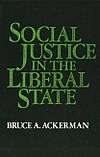Social Justice in the Liberal State

Social Justice in the Liberal State [1] is a book written by Bruce A. Ackerman.[2][3] The book is an essay in political philosophy,[2] a "new view" of the theoretical foundations of liberalism that will "challenge us to clarify our own implicit notions of liberal democracy."[4] Ackerman addresses the positive case for a liberalism that glorifies neither the state bureaucracy nor the private market. References to the sphere of relations among states are few, but the breadth of the attack on the fundamental issues of man and society is impressive.[5] To Ackerman, liberalism is a kind of structured conversation in which verbal negotiation among those with differing visions of the good life is an alternative to the exercise of naked power.[6] Ackerman has mounted a profound challenge to contract thinking. It works, crudely, on the idea that the premises of a course of contract reasoning can be manipulated so as to yield (more or less) any conclusion that the theorist has some antecedent interest in producing.[7] The social contract is the contract which would be confirmed by the entire population, under ideal conditions, after perfect and complete consideration.[8] Ackerman has offered a suggestion for determining whether any persons among a genetically diverse group are genetically disadvantaged. His suggestion is that to be genetically undominated, a person must possess a set of abilities that permit him to pursue some life purpose that some persons have, with as much facility as any other person is able to pursue that life purpose. He asserts that every person has a right to be genetically undominated.[9] The privatization of religious convictions is also strongly defended. Ackerman argues for a maximal separation doctrine in that religion does not have an appropriate place in the public realm of a liberal democracy.[10] The book also briefly suggests [11] "responsive lotteries",[12] prototypes of lottery voting as a way to decide issues but leaves the question hanging in the air by inviting others to devote more serious thought to lottery voting.[11]
See also
References
- ↑ Ackerman, Bruce A. (1980). Social justice in the liberal state. New Haven : Yale University Press. ISBN 0-300-02439-8.
- 1 2 Office of Public Affairs (1 March 2004). "YALE News Release". Yale Law School.
- ↑ Yale Law School. "Faculty". Retrieved 2006-07-16.
- ↑ Book Review Desk (30 November 1980). "Notable Books of the Year". Late City Final Edition. The New York Times. pp. 14, Column 1, Section 7.
- ↑ Campbell, John C. (1981). "Review: Social Justice in the Liberal State". Council on Foreign Relations. Retrieved 2006-07-16.
- ↑ Bull, Barry L. (1992). "The Creolization of Liberalism". College of Education at the University of Illinois at Urbana-Champaign. Retrieved 2006-07-16.
- ↑ D'Agostino, Fred (8 April 2003). "Contemporary Approaches to the Social Contract". Stanford Encyclopedia of Philosophy, Stanford University. Retrieved 2006-07-16.
- ↑ Treanor, Paul (11 January 2003). "The politics of John Rawls". Retrieved 2006-07-16.
- ↑ Tideman, Nicolaus (18 March 1997). "Peace, Justice, and Economic Reform". Achenbaum, Wyneth; wealthandwant.com. Retrieved 2006-07-16.
- ↑ Rieffer, Barbara Ann (2006). "Religion, Politics and Human Rights" (PDF). Human Rights & Human Welfare: An International Review of Books and Other Publications. Retrieved 2006-07-16.
- 1 2 Amar, Akhil Reed (Jun 1984). "93 Yale L.J. 1283" (PDF). The Yale Law Journal Company, Inc. Retrieved 2006-07-16.
- ↑ Amar, Akhil Reed (Mar 1984). "94 Colum. L. Rev. 457" (PDF). Directors of The Columbia Law Review Association. Retrieved 2006-07-16.
External links
- Social Justice in the Liberal State at Yale University Press
- Related works
- Citizenship: European and Global at Universitetet i Oslos
- Common schooling and educational choice at Washington University in St. Louis
- Just Health Care and the Two Solidarities at Harvard Center for Population and Development Studies
- Religious Virtues, Religious Vices at George Mason University
- Scholastic inclusion
- Public Lectures Academic Year 2002/2003 at Collegium Budapest Institute for Advanced Study
- SOC321 Social Justice at Lingnan University
- PH 3538 Social and Political Philosophy at University of Aberdeen
- Social Justice Resources at Colorado Christian University